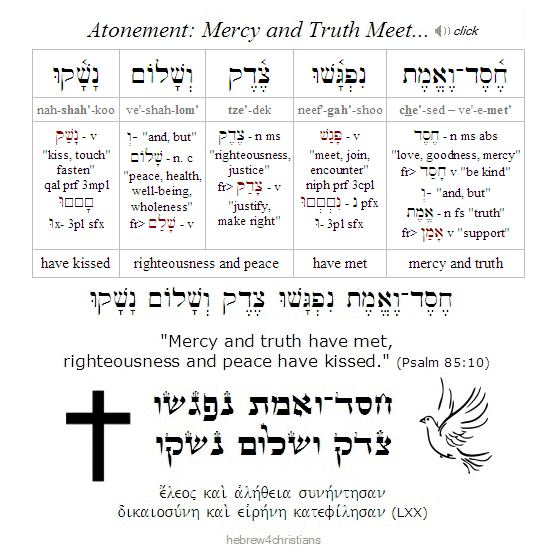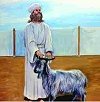|
Recall that the climax of the revelation given at Sinai was the commandment to construct the Sanctuary (מקְדָּשׁ), otherwise called the Mishkan (מִשְׁכָּן) or the "Tabernacle." In other words, the redemption secured by the blood of the lamb in Egypt led directly to the revelation of the laws of the altar revealed at Sinai. Nearly half of the Book of Exodus is focused on the Mishkan, and the book concludes with the Shekhinah Glory of God revealed at Sinai filling the Holy of Holies (Exod. 40:34-35).
The Book of Leviticus (וַיִּקְרָא) links the closing paragraph of the Book of Exodus with the religious practices within the Mishkan itself, and therefore it focuses on the various forms of offerings and sacrifices (i.e., zevachim: זְבָחִים) that were integral to the worship of God. As the climax of God's revelation at Sinai, the Mishkan became the place of God's revelation (Exod. 25:22; 30:36) and the locus of corporate worship. Prophetically, the Mishkan represented the redemptive plan of God for Israel that culminated in the revelation of Yeshua the Messiah as the appointed Lamb of God (i.e., seh ha-Elohim: שֵׂה הָאֱלהִים). The Book of Leviticus is therefore central to the Torah and provides the basis for understanding the multifaceted meaning of the sacrifice of Yeshua for our reconciliation with God. The great doctrines of the Atonement (καταλλαγή), propitiation for sin (i.e., ἱλαστήριος / כַּפָּרָה), and the meaning of the Cross of the Messiah as revealed in the New Testament are all grounded in the sacrificial system revealed in the Mishkan.
In modern English the word "sacrifice" usually means an act of self-deprivation, when we give up something of value for the sake of a greater value. In the Torah, however, the idea of sacrifice has more to do with making an offering to God as a means of drawing near to Him. Positively put, such sacrifices were intended to express gratitude and joy; negatively put, they were intended to remove obstacles caused by defilement and sin. Indeed, the most common Hebrew word used to describe sacrifice is korban (קָרְבָּן), which comes from the root karov (קָרַב) meaning to "draw close" or "to come near." In the Mishkan, korbanot (קָרְבָּנוֹת) were various ritual acts that were used for the worshipper to draw near to God.
It should be noted that most of the sacrifices were intended to be enjoyed as part of a communal meal or to provide sustenance for the priests. A portion of the animal was symbolically sacrificed to God, while the remainder was eaten by the sacrificer and his guests. In this way, a sense of communion between the people and God was realized. (During the Temple period, sacrifices were accompanied with music and singing). Only the olah (עלָה), or "whole burnt offering," was entirely consumed upon the altar. There are allusions that the sacrifices represented "food" for God (Lev. 1:9; Num. 28:2), though the Scriptures repeatedly warn against understanding this in anthropomorphic terms (e.g., Psalm 50:12-13), and the prophets later decried the idea that God desired sacrifices more than He demanded ethical behavior (Amos 5:22-25; Jer. 7:22-23; 1 Sam. 15:22-23; Hos. 6:6; Isa. 1:11-20; Micah 6:6-8). According to the prophets, there can be no legitimate substitution of ritual for personal moral responsibility, and their hyperbole was intended to "get the order right" in the matter of sacrifices. "To obey is better than sacrifices..." The point of the Torah sacrifices was to provide a sense genuine communion with God and others – and that implied a heartfelt commitment to justice and the ethical imperatives of the Torah. In no way was the sacrificial system intended to "bribe" God or to ask for good luck (as was the practice of many pagan sacrificial cults).
Some of the sacrifices defined in the Torah were intended for the entire community, such as the daily offering (קָרְבַּן תָּמִיד) of a lamb and unleavened bread that were sacrificed in the morning and evening (Exod. 29:38-42). Other communal sacrifices were intended to commemorate key historical events in the life of the nation, such as the Korban Pesach (Passover sacrifice), the observance of Sabbath, and the elaborate Yom Kippur ritual. These sacrifices were mandatory for the entire nation of Israel. Still other sacrifices were individual in nature. These were either freewill (i.e., nedavah: נְדָבָה) offerings intended for fellowship or required (i.e., chovah: חוֹבָה) offerings for cleansing from defilement and sin.
It should be recalled that that the very first sacrifice of the Torah was offered by God Himself, when He slaughtered a lamb to cover the shame of Adam and Eve (Gen. 3:21). After his transgression (and expulsion from the garden), Adam built an altar and offered sacrifices to the LORD as humanity's first high priest. Adam had taught his sons about sacrifice, though unfortunately his firstborn son Cain's offering was rejected because it came from the fruit of the earth that was cursed. On the other hand, God "turned to" Abel and his offering because it was based on the original sacrifice of the lamb (Gen. 4:3-5).
When Adam later died, his son Seth (שֵׁת) became high priest in his place. When Seth later died, the priesthood went to Methuselah (מְתוּשָׁלַח) who served for centuries. Methuselah was prophesied to die seven days before the advent of the great Flood, and upon his death his grandson Noach (נחַ) was commissioned to be humanity's high priest. Noach had learned the laws of sacrifice ("clean" and "unclean") from the books of Adam and Enoch as well as from his grandfather (Gen. 8:20). After the Flood, Noach rebuilt Adam's original altar in Jerusalem (which had been destroyed earlier by wicked people of the generation of the Flood). Later, however, he was disqualified to be priest and his firstborn son Shem (שֵׁם) took his place. Shem remained in Jerusalem (i.e., Salem) and became its king and high priest (the name "Malki-Tzedek" was later ascribed to him as an honorary title). From Shem's line would come Abraham, through whom would descend the Jewish people. Each of the Hebrew patriarchs – Abraham, Isaac, and Jacob – offered sacrifices upon altars to the LORD, as did Moses before the events at Sinai. Indeed, the Korban Pesach – the sacrifice of the Passover Lamb – was the very first sacrifice given to the nation of Israel, thereby recalling the original sacrifice that covered the shame of the original exile from Eden.
Hebrew Lesson
Psalm 85:10 reading:
 |
|



